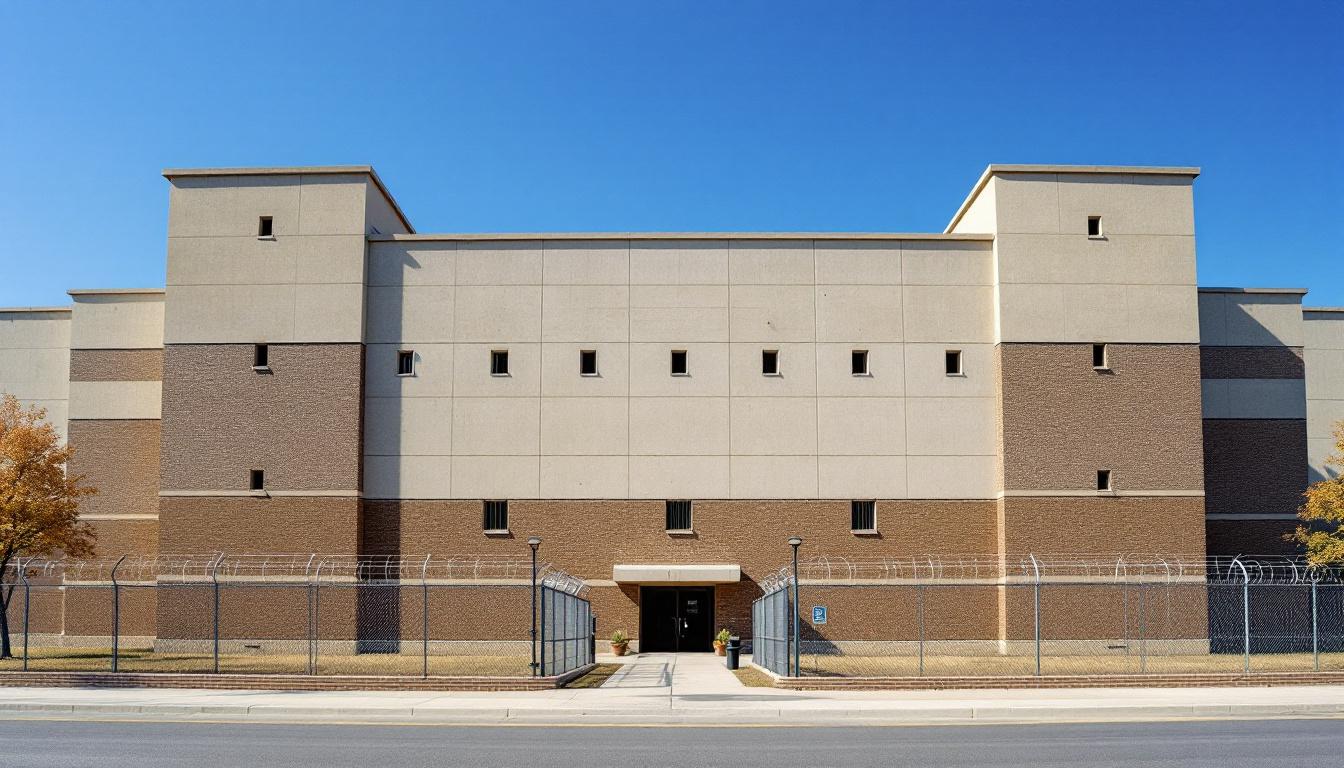
Quick Navigation
How to contact an inmate at Georgia Diagnostic and Classification State Prison
This comprehensive guide will walk you through how to connect with an inmate at Georgia Diagnostic and Classification State Prison. Follow the steps below to find an inmate and send letters and photos:
- Search for the inmate using our search tool below
- Create your account or log in to Penmate
- Write your message (up to 6,000 characters)
- Send instantly - inmates receive printed copies daily
Find an Inmate
Search for an inmate to start communicating today
Tip: You can search by first name, last name, or inmate ID number
To contact a person at Georgia Diagnostic and Classification State Prison start by searching for the person on the official facility website. Perform a search by following these steps:
- Step 1: Enter their first name and last name into the search form and click "Search"
- Step 2: Locate their inmate record
- Step 3: Write down their Inmate ID and any housing information provided
Important! Be sure to enter the person's full name. Nicknames should not be used.
How to Send Messages to Inmates

You can use your phone or computer to send emails, letters, and photos to an inmate. Messages are sent electronically to inmate tablets or kiosks at the facility. If you would like to send a message, start by searching for an inmate at Georgia Diagnostic and Classification State Prison.
Sending Photos and Postcards

A great way to send love and support to a loved one at Georgia Diagnostic and Classification State Prison is to send photos and postcards. It only takes a few minutes to send photos from your phone and it makes a huge difference. You can also mail postcards with words of support and inspiration, or design your own postcard for special moments like birthdays and holidays.
Important! Be sure not to send any explicit photos or they may not be approved by the facility. You can also use a photo printing app like Penmate to make sure your photos are printed at the correct size (4x6 or 3x5) and are mailed according to the rules and regulations of Georgia Diagnostic and Classification State Prison.
Frequently asked questions about Georgia Diagnostic and Classification State Prison
-
How long does it take to deliver a message?
If you're sending an email message your letter is usually delivered within 24-48 hours. For messages sent via mail you should expect delivery within 3-7 days. All messages will need be approved by Georgia Diagnostic and Classification State Prison.
-
How much does it cost to send a message to Georgia Diagnostic and Classification State Prison?
You can send a message free using your phone or mail a message via USPS for the price of a $0.60 stamp and envelope. You can also purchase credits or e-stamps from services starting at $1.99.
-
What services can I use to contact an inmate at Georgia Diagnostic and Classification State Prison?
Penmate
You can use Penmate to send letters and photos to an inmate from your phone. It's an easy way to stay in touch during your loved one's incarceration. Use the inmate locator to find an inmate's location and contact information, then you can send messages within a few minutes.
Securus messaging
Securus may be another option for communicating with an inmate at Georgia Diagnostic and Classification State Prison. You can create a friends and family account and purchase credits to send messages. All messages will be reviewed and must be approved by the facility.
JPay
Some county jails and state prisons may support sending messages with JPay. You must register an account with the system, find your loved one, and purchase stamps to send messages. For some locations you can also attach photos.
Smart Jail Mail
You may also check if Smart Jail Mail is available at Georgia Diagnostic and Classification State Prison. Smart Jail Mail is operated by Smart Communications and has contracted with some state and county jails. After purchasing credits, your messages and photos are sent to the facility, printed out, and then handed out to your loved one.
-
What is the mailing address of Georgia Diagnostic and Classification State Prison?
Mailing address:
Georgia Diagnostic and Classification State Prison
2978 GA-36
Jackson, GA 30233
Phone: (770) 504-2000Business hours:
- Monday: 8:00 AM – 4:30 PM
- Tuesday: 8:00 AM – 4:30 PM
- Wednesday: 8:00 AM – 4:30 PM
- Thursday: 8:00 AM – 4:30 PM
- Friday: 8:00 AM – 4:30 PM
- Saturday: Closed
- Sunday: Closed
-
What are the visiting hours at Georgia Diagnostic and Classification State Prison?
Visiting hours at Georgia Diagnostic and Classification State Prison vary by housing unit and security level. Generally, visits are scheduled on weekends and holidays, with some facilities offering weekday visits. Contact the facility directly at (770) 504-2000 or check their website for the current visiting schedule. Visits typically last 30-60 minutes and must be scheduled in advance.
-
What items are prohibited when sending mail to Georgia Diagnostic and Classification State Prison?
Prohibited items typically include: cash, personal checks, stamps, stickers, glitter, glue, tape, staples, paperclips, polaroid photos, musical or blank greeting cards, hardcover books, magazines with staples, and any items containing metal or electronics. Only send letters on plain white paper with blue or black ink. Photos must be printed on regular photo paper (no Polaroids). Always check with Georgia Diagnostic and Classification State Prison for their specific mail policies.
-
How do I send money to an inmate at Georgia Diagnostic and Classification State Prison?
You can send money to an inmate at Georgia Diagnostic and Classification State Prison through several methods: 1) Online using JPay, Access Corrections, or the facility's approved vendor, 2) Money orders mailed directly to the facility with the inmate's name and ID number, 3) Kiosks located in the facility lobby, or 4) Over the phone using a credit or debit card. Fees vary by method, typically ranging from $2.95 to $11.95 per transaction.
-
Can I schedule a video visit with an inmate at Georgia Diagnostic and Classification State Prison?
Many facilities now offer video visitation as an alternative to in-person visits. At Georgia Diagnostic and Classification State Prison, video visits may be available through services like Penmate, Securus Video Connect, GTL, or ICSolutions. Video visits typically cost $10-20 for 20-30 minutes and must be scheduled in advance. You'll need a computer or smartphone with a camera and reliable internet connection. Contact the facility for their specific video visitation policies and approved vendors.
-
What identification do I need to visit an inmate at Georgia Diagnostic and Classification State Prison?
All visitors must present valid government-issued photo identification such as a driver's license, state ID, passport, or military ID. Minors must be accompanied by a parent or legal guardian who can provide the minor's birth certificate. Some facilities require visitors to be on the inmate's approved visitation list, which may require a background check. Contact Georgia Diagnostic and Classification State Prison for specific ID requirements and visitor approval procedures.
-
How can I find out an inmate's release date?
To find an inmate's release date at Georgia Diagnostic and Classification State Prison, you can: 1) Use the online inmate search tool if available, 2) Call the facility's records department, 3) Contact the inmate's case manager or counselor, or 4) Have the inmate provide this information during a call or visit. For privacy reasons, some facilities only release this information to immediate family members.
Facility Overview
Contact Information
Georgia Diagnostic and Classification State Prison2978 GA-36
Jackson, GA 30233
Phone: (770) 504-2000
Official Website

About Georgia Diagnostic and Classification State Prison
Since 1968, West Jackson, Georgia has been home to a critical component of the state's correctional system through the Georgia Diagnostic and Classification Prison. This close-security facility serves multiple specialized functions within the Georgia Department of Corrections, operating with a capacity of 2,487 inmates and maintaining distinct housing units for various offender classifications. The facility underwent significant renovations in 1998 to enhance its operational capabilities and security infrastructure.
The Georgia Diagnostic and Classification Prison fulfills several essential roles, including conducting diagnostic processing for male offenders entering the state system and housing inmates assigned to specialized programs. The facility operates the 90-Day Segregated Transition Educated Program (S.T.E.P.), maintains housing for offenders Under Death Sentence (UDS), and operates a Special Management Unit for inmates requiring enhanced security measures. These diverse functions require the facility to maintain different visitation schedules and protocols depending on the inmate classification, with specific procedures in place for diagnostic offenders, general population inmates, and those in specialized housing units.
Located in West Jackson, the facility operates under a mission to ensure public safety while effectively housing offenders in a safe and secure environment. The prison's comprehensive approach includes carrying out state-ordered executions when required, reflecting its role as a maximum-security institution within Georgia's correctional system. Visitation policies vary significantly based on inmate classification, with diagnostic offenders subject to a 60-day waiting period and restricted to immediate family visits, while general population inmates typically have weekend and holiday visitation opportunities.
Programs & Services
The Segregated Transition Educated Program (S.T.E.P.) represents a specialized 90-day initiative at GA Diagnostic Class Prison, designed to support offenders through structured programming and educational opportunities. This facility serves multiple critical functions within Georgia's correctional system, conducting comprehensive diagnostic processing for male offenders while maintaining specialized housing units including those for offenders Under Death Sentence and a Special Management Unit. The diagnostic processing component typically involves thorough assessments that may include psychological evaluations, educational testing, medical examinations, and risk assessments to determine appropriate placement and programming needs throughout the state system.
Beyond its diagnostic and specialized housing functions, the facility may offer various rehabilitative services common to Georgia correctional institutions. Educational programs often include adult basic education, GED preparation, and literacy courses to help offenders develop fundamental academic skills. Vocational training opportunities may encompass areas such as building maintenance, food service, and other practical skills that support facility operations while providing inmates with marketable abilities for eventual reintegration. Mental health services typically include individual and group counseling, substance abuse treatment programs, and crisis intervention support, which are particularly important given the facility's role in housing various specialized populations.
The facility's comprehensive approach to offender management may also include religious services, recreational activities, and library access to support inmates' personal development and well-being. Work assignments within the facility often provide structured daily routines and may include roles in food service, maintenance, laundry, and other institutional operations. Given the facility's mission to ensure public safety while operating securely, all programming and services are typically delivered within a highly structured environment that maintains appropriate security protocols while supporting offenders' potential for positive change during their incarceration.
Daily Life & Visitation

Visitation schedules at GA Diagnostic Class Prison vary significantly based on housing assignment, with diagnostic offenders waiting 60 days before receiving visits from immediate family members on Mondays, Tuesdays, and Thursdays from 9:00am to 1:00pm. General population inmates typically enjoy weekend and holiday visits from 9:00am to 3:00pm, while those in specialized programs like the STEP (Segregated Transition Educated Program) may have different arrangements. The facility's complex scheduling reflects its multiple functions as both a diagnostic center for newly arrived male offenders and a housing unit for various security classifications, including those under death sentence.
The structured environment at this close-security facility, constructed in 1968 and renovated in 1998, centers around the diagnostic processing mission that gives the institution its name. Inmates undergoing the 90-day diagnostic evaluation typically experience a more regimented routine as staff assess their security level, medical needs, and program requirements. The facility's Special Management Unit houses those requiring enhanced security measures, while regular routines may include work assignments, educational opportunities, and recreational activities within the constraints of the close-security environment. Meal times, count procedures, and movement between housing areas follow strict schedules designed to maintain safety and security for the facility's capacity of 2,487 inmates.
Communication with family members becomes particularly important given the facility's role in processing new arrivals who may be adjusting to incarceration. Phone calls and mail correspondence typically follow standard Georgia Department of Corrections policies, though specific restrictions may apply based on housing assignment or security status. The facility's mission to "ensure public safety and effectively house offenders while operating a safe and secure facility" shapes all aspects of operations, from the timing of visits to the daily programming available to different inmate populations within this multi-purpose correctional institution.
Ready to Connect?
Start communicating with your loved one today
Search for an Inmate









